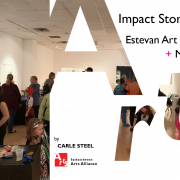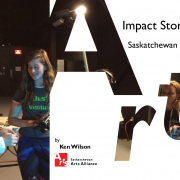Art Works – On the Boards Staging Company
Written by Carle Steel
 In the dark of the Refinery in Saskatoon, Rhonda Gallant-Morari and her band play before a live audience. The crowd of 60 is giddy; 40 more watch online. The live audience whistles and yells, excited to be out. There are even a couple of birthday girls at the show, one in the crowd, the other somewhere in BC. The audience is quiet when the musicians play a couple of traditional Ukrainian songs for the people caught in that sudden, terrible war. The music snaps them back to reality, one more punch to the gut.
In the dark of the Refinery in Saskatoon, Rhonda Gallant-Morari and her band play before a live audience. The crowd of 60 is giddy; 40 more watch online. The live audience whistles and yells, excited to be out. There are even a couple of birthday girls at the show, one in the crowd, the other somewhere in BC. The audience is quiet when the musicians play a couple of traditional Ukrainian songs for the people caught in that sudden, terrible war. The music snaps them back to reality, one more punch to the gut.
There have been many hits like that during the pandemic, derailing the plans of performers and the organizations like On The Boards who host them.
For over 20 years, the company has provided expertise and resources in the technical and administrative areas of production to help hundreds of independent artists and performer-producers stage their art. During the pandemic, however, cancellations have been the norm, and the Refinery space has been almost empty. Gallant-Morari’s concert had been cancelled twice before they finally pulled it off.
Cynthia Dyck, On The Boards’ Executive Director, says most performers have stopped trying to predict when they might reschedule their show, and have just cancelled instead. “It’s like leaving the gambling table,” she says. “At some point you just have to put your cards down.”
Like many arts organizations, On The Boards has used this downtime to quickly build technical capacity to work within this new, virtual world. “It’s forced us to move forward faster than anyone expected,” says Dyck. “The tech was there, but there was no impetus to do anything with it until the pandemic came.”
New technology has enriched what the company can offer. “We provide a venue, and now we’ve layered in the ability to stream with a live audience.” On The Boards has focused on training theatre professionals in this new way of presenting their art, a solid investment in young artists who must navigate performing in a post-Covid world.
Streaming has been a huge benefit to performers to develop their audiences, Dyck says. “Not every type of art has a local following,” Dyck says. Many performers represent smaller social communities within the city; others have a fan base elsewhere in the world. Streaming throws open the virtual doors for all performers. “They can develop audiences not just beyond Saskatoon, but beyond the province. When they develop those wider audiences, it’s good for them as artists, and it makes their work more sustainable.”
In the non-virtual world, the pandemic still rules.

While organizations like the Refinery have access to federal rent and wage subsidies to keep them afloat, the performers do not. “Independent artists don’t have a wage they can subsidize,” she says. Many organizations have been hiring artists for odd jobs just to keep them working.
“The threat now is not to the audiences, it’s to the performers,” she says. “Someone in a group gets sick, and it’s ‘Now what?’ They can’t perform.”
“That’s the biggest variable going forward.”
Carle Steel is a Regina-based writer, journalist and arts administrator. She has worked in publishing and for arts service organizations, including the Saskatchewan Writers’ Guild and the Association of English language Publishers of Quebec. Most recently, she was the Literary Arts Program Consultant at SK Arts, and was responsible for Access Copyright Foundation programs. Her fiction and creative non-fiction have been shortlisted for the CBC Literary Awards, the City of Regina Writing Award, and The Writers’ Union of Canada’s Short Prose Competition for Emerging Writers. Carle holds a Bachelor of Arts (French) and a Bachelor of Journalism from the University of Regina and a Master of Fine Arts in creative writing from the University of Guelph. She is currently at work on her first novel.







